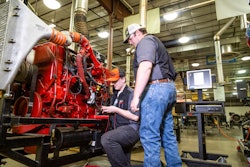Turnover has been and continues to be a widespread problem and topic of conversation in our industry. We all know turnover is costly and inefficient and damages company culture, not to mention the bottom line. But the good news is that it’s within our power to change it.
Since 2015, my company has been asking drivers two simple questions: “How are you doing right now?" and "Why do you feel that way?”
These prompts have yielded hundreds of thousands of comments from nearly 75,000 drivers across the United States, and we’re constantly analyzing trends among their responses, as well as working alongside carriers to address the issues driver feedback uncovers.
Turnover issue No. 1: Pay
Pay is a hot topic in the industry, but what we commonly see isn’t that drivers are dissatisfied with their rate of pay. They’re normally just confused about payment systems, schedules and other procedural components of a compensation program. This means that drivers leaving a company because of pay could very likely be retained if they had an outlet for questions and concerns, which conveniently leads me to…
Turnover issue No. 2: Not knowing where to go with questions
By nature of the job, drivers are on the road far more often than they’re in an office. This not only makes it more difficult for drivers to know where to go with problems and questions, but also diminishes the likelihood of some workers speaking up.
Turnover issue No. 3: Poor treatment in the past
Many drivers come with the emotional baggage of being disrespected or treated as just a number at previous places of employment. If a driver doesn’t have the chance to share feedback anonymously, he or she may find it easier to hop to a new carrier than to muster the courage to deliver constructive criticism.
Turnover issue No. 4: Insufficient training
If a worker isn’t sufficiently trained, there’s a good chance he or she will wind up dissatisfied. Think about it: If you were constantly running into roadblocks or challenges in your job and you weren’t sure how to remedy them, how long would you stick around? With jobs so readily available, drivers will often seek greener pastures at another place of employment.
The remedy? Better communication
There’s a saying that “no news is good news,” but when it comes to hearing from your workers this simply isn’t the case. When you’re not communicating with your drivers, they’re likely not communicating with you. They’re more likely to fill in the gaps with their own assumptions and you’re more likely to fill in the gaps with yours. Policies built based on assumptions are just as costly and inefficient as turnover itself, so I’d strongly encourage company leaders to find ways to ask workers what it is that they need to succeed – and in an ongoing fashion.
As you’re considering opening the lines of communication at your company, be sure you have a plan in place for each of the following:
● Enabling anonymity. Anonymous feedback is the best kind because workers aren’t afraid of retribution. No matter how “open” an open-door policy is, you’ll never get the type of honest feedback you want without this critical component.
● Real-time check-ins. We often call exit interviews autopsy reports. The same is true of annual or even quarterly surveys. If you’re not checking in on workers regularly, you’re likely to miss issues that could be fixed.
● Speedy response times. Sharing constructive criticism can be difficult. If a driver goes out on a limb to share an issue only to be met with no response, it’s likely that feelings of tension and frustration will intensify. Be sure you have a plan for how you’ll respond to both individuals and groups in a timely manner.
● Sharing the wins. It’s easy to assume that all feedback you’ll receive is negative, but this couldn’t be further from the truth. Drivers frequently share what’s going well, which helps shine a spotlight on other team members and policies that are supporting them well. Use these comments to build on what’s working and foster a culture of respect within your organization.
Max Farrell is CEO and co-founder of WorkHound, a real-time feedback platform that enables anonymous two-way communication between frontline workers and their employers.











